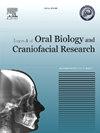情绪智力对医患关系的影响:问卷编制、验证及初步研究
Q1 Medicine
Journal of oral biology and craniofacial research
Pub Date : 2025-04-18
DOI:10.1016/j.jobcr.2025.04.003
引用次数: 0
摘要
牙医与病人的关系是成功的牙科护理的关键组成部分。情绪智力(EI)已经成为影响患者体验和提高护理质量的一个重要因素。本研究旨在编制问卷,验证问卷的有效性,并评估情商对医患关系的影响。材料与方法本研究分四个阶段进行。第一阶段是焦点小组讨论,并编制初步问卷。第二阶段是初步问卷的验证,第三阶段是评估初步问卷内部一致性的试点研究。第四阶段是使用最终问卷来评估EI对医患关系的影响。本文于2024年9月对200名牙医进行了横断面调查。结果最终问卷的CVI和CVR分别为;0.8, κ = 81%,表明内部一致性良好。最终问卷内部一致性较好,Cronbach α值>;0.7. 超过40%的参与者认为,情商有助于在牙科实践中做出道德决策。此外,41.5%的牙医建议在牙科学校接受情商方面的正式培训。结论通过培养信任、改善沟通和管理情绪挑战,牙科专业人员可以提高护理质量和患者体验。在牙科课程中实施以ei为重点的模块可以更好地为未来的牙医做好准备,以管理患者护理的情感和心理方面。本文章由计算机程序翻译,如有差异,请以英文原文为准。

Influence of emotional intelligence on patient-dentist relationships: A questionnaire development, validation and pilot study
Background
The Dentist-Patient relationship is a crucial component of successful dental care. Emotional intelligence (EI) has emerged as an important factor that can shape patient experiences and improve the quality of care. The present study was aimed to develop a questionnaire, validate the questionnaire, and assess how EI influences the dentist-patient relationship.
Materials and methods
This study was conducted in four phases. First phase was a focus group discussion with preliminary questionnaire development. Phase II was validation of the preliminary questionnaire and phase III was a pilot study that assessed the internal consistency of the preliminary questionnaire. Phase IV was the survey conducted to assess the influence of EI on dentist-patient relationship using the final questionnaire. A cross-sectional survey was conducted with 200 dentists in the month of September 2024.
Results
The CVI and CVR of the final questionnaire was found to be > 0.8 with κ = 81 % suggestive of good intra-rater agreement. The internal consistency of the final questionnaire was good with Cronbach's α value > 0.7. More than 40 % of the participants had an opinion that emotional intelligence helps in making ethical decisions in dental practice. Also, 41.5 % of the dentists suggested for a formal training in emotional intelligence in dental schools.
Conclusion
By fostering trust, improving communication, and managing emotional challenges, dental professionals can enhance the quality of care and patient experiences. Implementing EI-focused modules into dental curricula can better prepare future dentists to manage the emotional and psychological aspects of patient care.
求助全文
通过发布文献求助,成功后即可免费获取论文全文。
去求助
来源期刊

Journal of oral biology and craniofacial research
Medicine-Otorhinolaryngology
CiteScore
4.90
自引率
0.00%
发文量
133
审稿时长
167 days
期刊介绍:
Journal of Oral Biology and Craniofacial Research (JOBCR)is the official journal of the Craniofacial Research Foundation (CRF). The journal aims to provide a common platform for both clinical and translational research and to promote interdisciplinary sciences in craniofacial region. JOBCR publishes content that includes diseases, injuries and defects in the head, neck, face, jaws and the hard and soft tissues of the mouth and jaws and face region; diagnosis and medical management of diseases specific to the orofacial tissues and of oral manifestations of systemic diseases; studies on identifying populations at risk of oral disease or in need of specific care, and comparing regional, environmental, social, and access similarities and differences in dental care between populations; diseases of the mouth and related structures like salivary glands, temporomandibular joints, facial muscles and perioral skin; biomedical engineering, tissue engineering and stem cells. The journal publishes reviews, commentaries, peer-reviewed original research articles, short communication, and case reports.
 求助内容:
求助内容: 应助结果提醒方式:
应助结果提醒方式:


